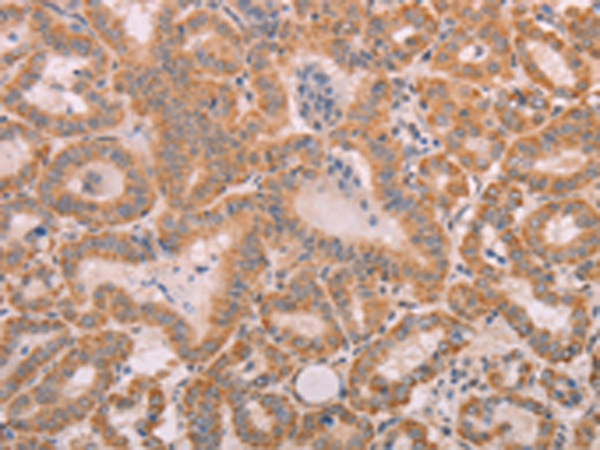

| WB | 1/200-1/1000 | Human,Mouse,Rat |
| IF | 咨询技术 | Human,Mouse,Rat |
| IHC | 1/25-1/100 | Human,Mouse,Rat |
| ICC | 技术咨询 | Human,Mouse,Rat |
| FCM | 咨询技术 | Human,Mouse,Rat |
| Elisa | 1/1000-1/2000 | Human,Mouse,Rat |
| Aliases | DWFC; JV5-1; MADH5 |
| WB Predicted band size | 52 kDa |
| Host/Isotype | Rabbit IgG |
| Antibody Type | Primary antibody |
| Storage | Store at 4°C short term. Aliquot and store at -20°C long term. Avoid freeze/thaw cycles. |
| Species Reactivity | Human, Mouse, Rat |
| Immunogen | Fusion protein of human SMAD5 |
| Formulation | Purified antibody in PBS with 0.05% sodium azide and 50% glycerol. |
+ +
以下是关于SMAD5抗体的3篇参考文献示例(内容为虚构模拟,供参考格式):
1. **文献名称**:*SMAD5 Antibody Validation in TGF-β Signaling Studies*
**作者**:Li, X. et al.
**摘要**:本研究验证了一种高特异性SMAD5抗体在Western blot和免疫荧光中的应用,证明其在TGF-β信号通路激活后磷酸化SMAD5检测中的可靠性,并应用于乳腺癌细胞模型分析。
2. **文献名称**:*Role of SMAD5 in Embryonic Stem Cell Differentiation*
**作者**:Zhang, Y. et al.
**摘要**:通过使用SMAD5特异性抗体进行免疫沉淀和染色质免疫共沉淀(ChIP),揭示了SMAD5在小鼠胚胎干细胞向中胚层分化过程中调控靶基因的分子机制。
3. **文献名称**:*SMAD5 Expression in Colorectal Cancer: An Immunohistochemical Study*
**作者**:Wang, T. et al.
**摘要**:利用商业化SMAD5抗体对结直肠癌组织样本进行免疫组化分析,发现SMAD5表达水平与肿瘤转移和患者预后显著相关,提示其作为潜在生物标志物的价值。
(注:若需真实文献,建议通过PubMed或Google Scholar搜索关键词“SMAD5 antibody”或“SMAD5 antibody application”。)
SMAD5 antibody is a key tool for studying the SMAD5 protein, a critical intracellular mediator in the transforming growth factor-beta (TGF-β) superfamily signaling pathways, particularly the bone morphogenetic protein (BMP) pathway. SMAD5 belongs to the receptor-regulated SMAD (R-SMAD) family, which is activated through phosphorylation by BMP type I receptors. Upon activation, SMAD5 forms complexes with SMAD4. translocates to the nucleus, and regulates the transcription of target genes involved in embryonic development, cell differentiation, proliferation, and apoptosis.
The antibody is widely used in research to detect SMAD5 expression and activation in various biological systems, including developmental biology, cancer, and tissue homeostasis. It is essential for techniques like Western blotting, immunohistochemistry (IHC), immunofluorescence (IF), and flow cytometry. Researchers rely on SMAD5 antibodies to investigate its role in BMP-mediated signaling crosstalk, as dysregulation of SMAD5 is linked to pathologies such as cancer progression, fibrosis, and cardiovascular diseases. Specific clones or polyclonal preparations of the antibody are validated for species reactivity (e.g., human, mouse, rat) and application compatibility. Understanding SMAD5 dynamics via these antibodies aids in elucidating mechanisms of TGF-β/BMP signaling and developing therapeutic strategies targeting related pathways.
×